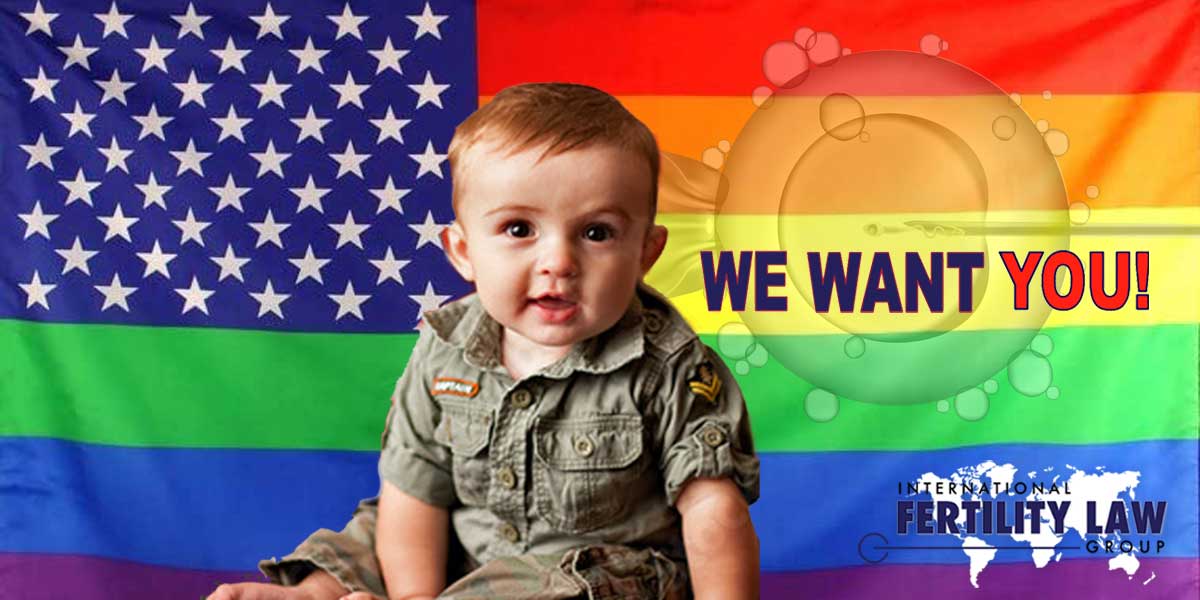
11 Aug 2021 New Law to Provide Fertility Services to All Veterans
Currently pending before Congress is legislation that would offer an expanded range of fertility treatment services to U.S. veterans, including to many LGBTQ+ veterans who have previously been denied equal benefits due to narrow, outdated and discriminatory Veterans Administration rules.
We’ve been following this issue and the valiant efforts of U.S. Senator Patty Murray (D-Wa.) since 2012, as she has fought to give U.S. military veterans fertility treatment and reproductive health benefits. With a Democratic-majority House and a narrow majority in the Senate, could 2021 be the year all our veterans finally have the family-building support they have earned by serving our country.
Veterans Fertility Benefits Run Afoul of Anti-Abortion Politics
“The subject of fertility coverage for current and former soldiers is tangled up in the politics of both the abortion debate and the budget battles over Pentagon programs,” The Washington Post reported in July 2016.
Active-duty military have been eligible for some types of assisted reproductive technologies such as in vitro fertilization (IVF) for some time. But in 1992, conservative lawmakers with religious objections to IVF banned the Veterans Affairs Department from providing IVF to veterans whose ability to reproduce had been impacted by service-related injuries.
By the summer of 2016, months before the election of Republican Donald Trump, Murray had sufficient bi-partisan support for a bill extending fertility services to veterans, even though it got tangled up in in the Senate in a fight over funding the campaign against Zika, the mosquito-borne virus that caused birth defects in pregnant women then making international headlines.
As the Washington Post reported, “the inclusion of language ending the 1992 ban was the first bipartisan win on the issue since Murray started pushing for a legislative change in 2012.
Murray’s bill was passed in fall 2016, but subsequent Senate spending bills cut all funding for the program. The VA and Department of Defense has continued providing fertility services to many veterans by using different funding sources, but those funds have to be reauthorized by Congress every year.
Bill Offers Permanent Funding for Veterans Reproductive Services
New legislation could fix that problem. The Veterans Families Health Services Act of 2021 was introduced in April by Murray and Senator Tammy Duckworth, a wounded warrior who became a mother via assisted reproduction and was heard June 23 before the Senate Committee on Veterans Affairs. If enacted, the new law would significantly expand access to fertility services for both veterans and active-duty service members. According to a summary provided by Duckworth’s office, the act would:
- Allow servicemembers to cryopreserve their gametes before deployment to a combat zone or hazardous duty assignment and after an injury or illness.
- Permanently authorize fertility treatment and counseling, including assisted reproductive technology like IVF, for veterans and servicemembers and allow for the use of donated gametes.
- Ensure that veterans’ and servicemembers’ spouses, partners, and gestational surrogates are appropriately included in eligibility rules.
- Provide support for servicemembers and veterans to navigate their options, find a provider that meets their needs, and ensure continuity of care after a permanent change of station or relocation.
- Expand options for veterans with infertility by allowing VA to provide adoption assistance.
- Require VA and DoD to facilitate research on the long-term reproductive health needs of veterans.
The bill has been endorsed by numerous advocacy organizations, including Paralyzed Veterans of America, RESOLVE: the National Infertility Association, the Center for Reproductive Rights, Military Family Building Coalition, Disabled American Veterans (DAV), and the American Society for Reproductive Medicine (ASRM).
Veterans’ Reproductive Rights at Risk from Political Divide
With the White House and both houses of Congress in Democratic hands, albeit narrowly, this may be the best opportunity to ensure veterans and military servicemembers receive the reproductive healthcare they have earned. It is uncertain whether the bi-partisan support that existed for the legislation in 2016 will survive today’s bitterly divided politics.
To deny equal military and veterans’ benefits to LGBTQ people willing to make the ultimate sacrifice in service to their country would be shameful. As we reported in 2016, even veterans with combat injuries that caused infertility have felt abandoned. Veteran Kevin Jaye, who stepped on a bomb in Afghanistan, and his wife were able to become parents using IVF, only because the wife’s employer-provided health insurance covered the treatment. Other veterans are not as fortunate. “We went to war with the sole promise that if we were injured and came back, the country would put us back together again,” he said. “There’s technology available that can allow my wife and I to have our own kids and have that same exact dream that everybody else strives for… and that’s just what we’re striving to achieve here.”

















